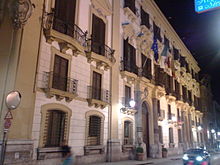|
Via Maqueda
Via Maqueda, also known as "Strada Nuova" (New Street), is an important street of Palermo. Together with the Cassaro, it represents the main axis of the historic centre and provides access to a number of important sights, including Teatro Massimo and Fontana Pretoria. The street is named after the Viceroy of Sicily Bernardino de Cárdenas y Portugal, Duque de Maqueda. HistoryIn the late sixteenth century the opening of the street was decided. It was conceived as an axis destined to cross the most ancient road of Palermo, the millennial Cassaro. The creation of the street addressed the need of a more sliding traffic and the requests of the nobility, eager to have new spaces for its buildings. The work was designed in 1577 and completed in 1599, during the period of the Viceroy Maqueda. On 24 July 1600 the street was inaugurated.[1] StructureThe street is perfectly straight from Piazza Verdi, near Teatro Massimo, to Porta di Vicari, near the Palermo Centrale railway station. With the Cassaro, Via Maqueda forms the famous Baroque intersection known as Quattro Canti (Piazza Villena). The two streets are also called "Croce Barocca" (Baroque Cross). TransportDuring daylight hours, the street is pedestrian in the stretch from Piazza Verdi to Quattro Canti. Places of interest    See alsoWikimedia Commons has media related to Via Maqueda (Palermo). References
External links |
||||||||||
